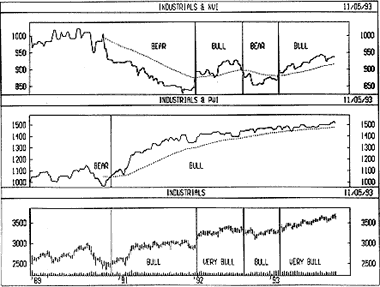|
POSITIVE VOLUME INDEX Overview The Positive Volume Index ("PVI") focuses on days where the volume increased from the previous day. The premise being that the "crowd" takes positions on days when volume increases. Interpretation Interpretation of the PVI assumes that on days when volume increases, the crowd-following "uninformed" investors are in the market. Conversely, on days with decreased volume, the "smart money" is quietly taking positions. Thus, the PVI displays what the not-so-smart-money is doing. (The Negative Volume Index, displays what the smart money is doing.) Note, however, that the PVI is not a contrarian indicator. Even though the PVI is supposed to show what the not-so-smart-money is doing, it still trends in the same direction as prices. The following table summarizes NVI and PVI data from 1941 through 1975 as explained in Stock Market Logic, by Norman Fosback.
As you can see, NVI is excellent at identifying bull markets (i.e., when the NVI is above its one-year moving average) and the PVI is pretty good at identifying bull markets (when the PVI is above its moving average) and bear markets (i.e., when the PVI is below its moving average). Example The following chart shows the NVI, the PVI, and the Dow Jones Industrial Average ("DJIA") over a four year period (weekly data).
I labeled both the NVI and PVI indicators bullish or bearish depending on if they were above or below their 52-week moving averages. I then labeled the DJIA as Bullish when either the NVI or PVI was above its moving average, and as Very Bullish when both the indicators were above their moving averages. Calculation If today's volume is greater than yesterday's volume then:
If today's volume is less than or equal to yesterday's volume then:
Because rising prices are usually associated with rising volume, the PVI usually trends upward. |
||||||||||||||||||||||||
